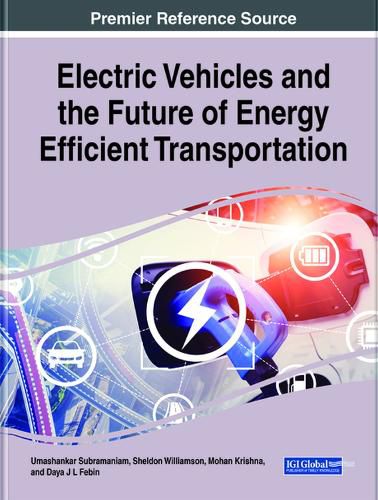Readings Newsletter
Become a Readings Member to make your shopping experience even easier.
Sign in or sign up for free!
You’re not far away from qualifying for FREE standard shipping within Australia
You’ve qualified for FREE standard shipping within Australia
The cart is loading…






This title is printed to order. This book may have been self-published. If so, we cannot guarantee the quality of the content. In the main most books will have gone through the editing process however some may not. We therefore suggest that you be aware of this before ordering this book. If in doubt check either the author or publisher’s details as we are unable to accept any returns unless they are faulty. Please contact us if you have any questions.
The electric vehicle market has been gradually gaining prominence in the world due to the rise in pollution levels caused by traditional IC engine-based vehicles. The advantages of electric vehicles are multi-pronged in terms of cost, energy efficiency, and environmental impact. The running and maintenance cost are considerably less than traditional models. The harmful exhaust emissions are reduced, besides the greenhouse gas emissions, when the electric vehicle is supplied from a renewable energy source. However, apart from some Western nations, many developing and underdeveloped countries have yet to take up this initiative. This lack of enthusiasm has been primarily attributed to the capital investment required for charging infrastructure and the slow transition of energy generation from the fossil fuel to the renewable energy format. Currently, there are very few charging stations, and the construction of the same needs to be ramped up to supplement the growth of electric vehicles. Grid integration issues also crop up when the electric vehicle is used to either do supply addition to or draw power from the grid. These problems need to be fixed at all the levels to enhance the future of energy efficient transportation. Electric Vehicles and the Future of Energy Efficient Transportation explores the growth and adoption of electric vehicles for the purpose of sustainable transportation and presents a critical analysis in terms of the economics, technology, and environmental perspectives of electric vehicles. The chapters cover the benefits and limitations of electric vehicles, techno-economic feasibility of the technologies being developed, and the impact this has on society. Specific points of discussion include electric vehicle architecture, wireless power transfer, battery management, and renewable resources. This book is of interest for individuals in the automotive sector and allied industries, policymakers, practitioners, engineers, technicians, researchers, academicians, and students looking for updated information on the technology, economics, policy, and environmental aspects of electric vehicles.
$9.00 standard shipping within Australia
FREE standard shipping within Australia for orders over $100.00
Express & International shipping calculated at checkout
This title is printed to order. This book may have been self-published. If so, we cannot guarantee the quality of the content. In the main most books will have gone through the editing process however some may not. We therefore suggest that you be aware of this before ordering this book. If in doubt check either the author or publisher’s details as we are unable to accept any returns unless they are faulty. Please contact us if you have any questions.
The electric vehicle market has been gradually gaining prominence in the world due to the rise in pollution levels caused by traditional IC engine-based vehicles. The advantages of electric vehicles are multi-pronged in terms of cost, energy efficiency, and environmental impact. The running and maintenance cost are considerably less than traditional models. The harmful exhaust emissions are reduced, besides the greenhouse gas emissions, when the electric vehicle is supplied from a renewable energy source. However, apart from some Western nations, many developing and underdeveloped countries have yet to take up this initiative. This lack of enthusiasm has been primarily attributed to the capital investment required for charging infrastructure and the slow transition of energy generation from the fossil fuel to the renewable energy format. Currently, there are very few charging stations, and the construction of the same needs to be ramped up to supplement the growth of electric vehicles. Grid integration issues also crop up when the electric vehicle is used to either do supply addition to or draw power from the grid. These problems need to be fixed at all the levels to enhance the future of energy efficient transportation. Electric Vehicles and the Future of Energy Efficient Transportation explores the growth and adoption of electric vehicles for the purpose of sustainable transportation and presents a critical analysis in terms of the economics, technology, and environmental perspectives of electric vehicles. The chapters cover the benefits and limitations of electric vehicles, techno-economic feasibility of the technologies being developed, and the impact this has on society. Specific points of discussion include electric vehicle architecture, wireless power transfer, battery management, and renewable resources. This book is of interest for individuals in the automotive sector and allied industries, policymakers, practitioners, engineers, technicians, researchers, academicians, and students looking for updated information on the technology, economics, policy, and environmental aspects of electric vehicles.